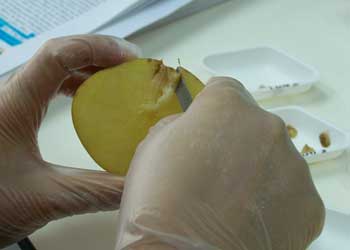IGC research into pathogenic bacteria

The team has been investigating the ways in which bacteria “speak” with each other in order to adjust their behaviours to environmental alterations or in the presence of other species. The language they utilise incorporates small chemical molecules that are released into the surrounding environment whenever there is a high number of bacteria belonging to a particular species. These signals inform the bacteria population that may adjust their behaviours so as to become more virulent. In this study, the IGC team focused on Pectobacterium wasabiae, a bacteria species that degrades the walls of plant cells resulting in the tissue rotting. The research team discovered the virulent response of this bacteria type may be triggered even while at low densities whenever this bacteria receives chemical molecules released by other pathogenic species present in the same environment. “These molecules enable the bacteria to communicate with each other and are essential to activating their virulent behaviours”, explained Karina Xavier before adding that “blocking these signals and inhibiting the communication established among bacteria constitutes a very promising approach that needs greater exploration so as to develop strategies able to inhibit the virulence of pathogenic agents”. This study was financed by the Portuguese FCT – Foundation of Science and Technology and by the Howard Hughes Medical Institute.
